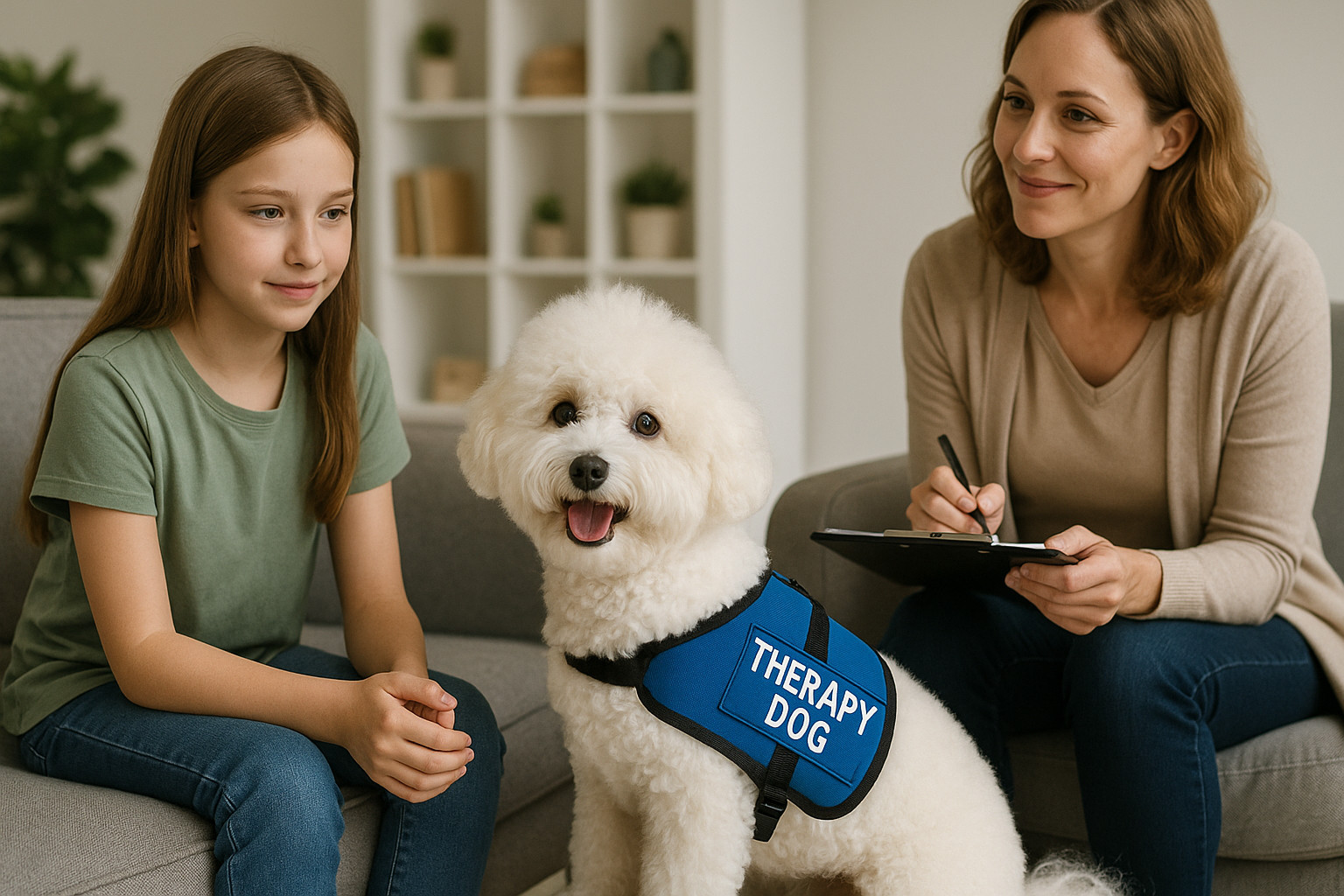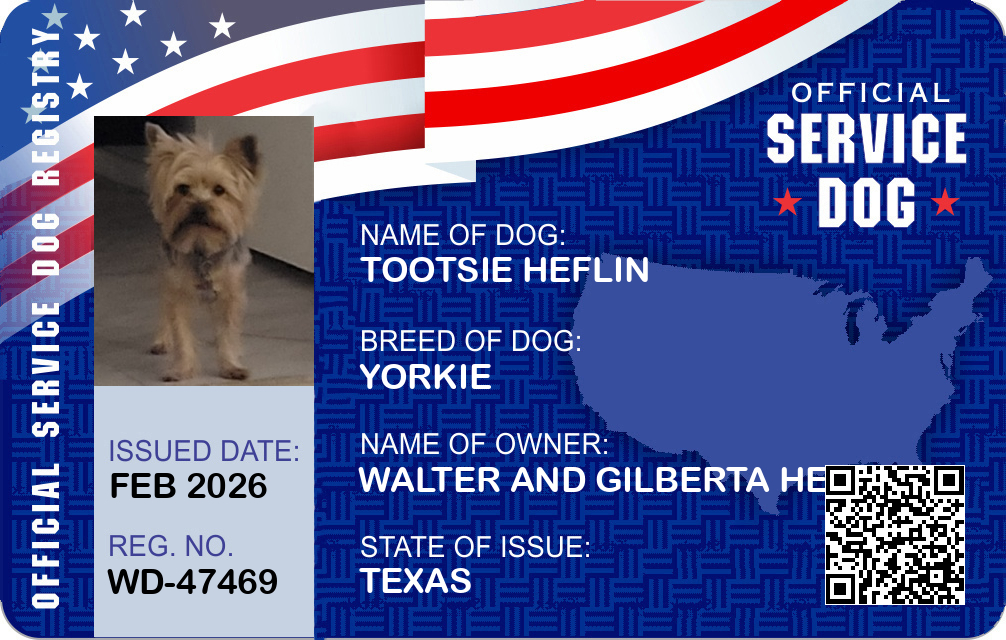Bichon Frise as a Therapy Dog
Get Your Documents

Bichon Frise as a Therapy Dog Overview
The Bichon Frise, with its charming disposition and adaptable nature, has continuously gained popularity as a therapy dog. Recognized for their cheerful demeanor and natural empathy, Bichon Frises provide comfort and companionship to individuals in need. The following article delves into various facets that make this breed a proficient therapy dog, including temperament, physicality, health considerations, and optimal working environments.
Understanding the Therapy Dog Role
Therapy dogs play an invaluable role by providing emotional support and comfort. Unlike service dogs, therapy dogs work alongside handlers to meet emotional and psychological needs across diverse environments. Their presence counteracts feelings of isolation, anxiety, and stress in various settings such as hospitals, nursing homes, schools, and rehabilitation centers. To fulfill these roles effectively, therapy dogs must exhibit patience, friendliness, and consistent behavior; qualities that align well with the natural traits of a Bichon Frise.
Physical Appearance and Energy Level
The Bichon Frise is a small, sturdy dog known for its curly, hypoallergenic coat, which often aids their acceptance in environments where allergies are a concern. Their vibrant energy and agility enable them to engage with patients and individuals easily, making them lively but controlled companions.
- Coat: The soft, coiled fur requires consistent grooming to maintain hygiene, particularly important in settings with vulnerable populations.
- Size: Their small stature makes them non-intimidating, especially for young children or individuals unfamiliar with dogs.
- Energy: Moderate energy levels allow for sustained interaction, yet their innate capacity to relax on command benefits quieter environments needing calm presence.
Personality and Emotional Intelligence
Bichon Frises are renowned for their affable nature and emotional intelligence, making them adept at perceiving human emotions and responding appropriately. Their disposition is generally animated and sociable, creating an atmosphere of joy and warmth wherever they go.
- Empathy: Their heightened sensitivity renders them responsive to emotional cues, allowing them to tailor interactions based on human emotional states.
- Calmness: Despite their playful energy, they can exhibit remarkable calmness and adapt quickly to the emotional atmosphere of their environment.
- Adaptability: Whether engaging in active play or offering quiet companionship, their versatile nature allows them to adjust behaviors per situational needs.
Environments Where Bichon Frise Excels
The Bichon Frise thrives in environments that capitalize on their friendly and engaging personalities while allowing their physical and emotional strengths to shine. Some ideal settings include:
- Schools: Their good-natured and friendly demeanor makes them ideal for interacting with children, promoting affection and providing an educational experience.
- Hospitals/Rehabilitation Centers: Their comforting presence and non-threatening size make them effective in uplifting patients and aiding recovery.
- Assisted Living Facilities: Their love for human interaction creates meaningful connections with elderly residents, fostering a sense of companionship and reducing loneliness.
Common Therapy Settings
In collective settings like hospitals and retirement homes, Bichon Frises offer gentle support and joy. Their sociable nature shines in spaces where multiple individuals benefit from collective interaction.
- Group Interactions: Their size and temperament lend well to group visits, promoting socialization among residents or patients in therapy groups.
- Hospice Care: Their more subdued demeanor, when necessary, provides peaceful, comforting support to patients in delicate health conditions.
- Libraries/Reading Programs: Their patience and calm vibe aid in programs designed to encourage reading in children by creating a relaxed and enjoyable atmosphere.
Interactions with Different Populations
When interacting with diverse populations—from children to elderly to those with disabilities—the Bichon Frise’s physical and emotional traits play a vital role:
- Children: Their playful yet gentle nature builds rapport and offers an engaging play partner while teaching about responsibility and nurture.
- Elderly: The Bichon’s gentle nature and affection lead to deep connections, often activating fond memories and fostering calming experiences.
- Patients with Disabilities: Versatile in adapting to the needs of individuals with various disabilities, their assistance can range from physical comfort to emotional support.
Health and Wellness Factors
Health is a significant consideration for any therapy dog, as it directly impacts their ability to perform in therapy settings consistently and safely.
#### Lifespan and Common Health Issues
The Bichon Frise typically has a lifespan of 12–15 years, with a predominantly robust health profile. However, some common wellness issues to consider include:
- Allergies: Their hypoallergenic coat is suitable for allergy-conscious environments but requires maintenance to prevent matting and skin issues.
- Ear Infections: Prone to ear infections due to their floppy ears, necessitating regular checks and cleaning.
- Dental Health: Small breeds often face dental issues, requiring routine dental care to prevent complications that could impede therapy work.
Maintenance and Care Needs
To ensure a Bichon Frise is fit for therapy roles, their care demands careful attention.
- Grooming: Regular grooming maintains their coat’s hypoallergenic properties and ensures they remain clean and presentable for therapy sessions.
- Exercise: While minimal, consistent exercise is vital to balancing their energy levels and maintaining physical health.
- Diet: A balanced diet supports their health and energy, ensuring they remain vibrant and ready for therapy activities.
Training and Certification Readiness
The Bichon Frise’s intelligence, patience, and sensitivity contribute positively to their trainability. These traits affect their readiness for therapy certification in several ways:
#### Learning Style and Responsiveness
Bichon Frises are eager learners, taking well to positive reinforcement training methods. Their quick learning enhances their capability to internalize therapy-specific behaviors.
- Positive Reinforcement: Easily motivated by treats and affection, they excel in environments utilizing these training methods.
- Problem Solving: Engagement with problem-solving tasks hones their intelligence, keeping their minds active and sharp for varied therapy tasks.
#### Handling Social and Emotional Stimuli
Their ability to handle diverse social and emotional stimuli highlights their suitability for therapy work. Their responsive nature enables them to adapt quickly to different emotional contexts, offering reassurance and comfort when needed.
- Social Adaptability: They manage group settings and individual interactions well, adjusting their demeanor seamlessly across dynamic situations.
- Emotional Intelligence: Recognizing distress leads to appropriate comforting behaviors, making them invaluable to clients in emotional discomfort.
Strengths, Limitations, and Ideal Roles for Bichon Frise
The Bichon Frise offers several key strengths as a therapy dog, along with some limitations:
- Strengths:
- Their affectionate and friendly nature ensures widespread appeal.
- Small size and hypoallergenic coat make them well-suited for most environments.
- High emotional intelligence fosters excellent empathy and comfort delivery.
- Limitations:
- High maintenance grooming needs could limit availability or require additional scheduling considerations.
- Early and consistent training is crucial to prevent small dog syndrome, where they may display undesirable behaviors if not properly socialized.
Final Thoughts
In conclusion, the Bichon Frise presents as an ideal candidate for therapy work, offering warmth and emotional comfort across varied settings. Their unique combination of intelligence, amiability, and adaptability positions them effectively to meet the nuanced needs of patients and clients in therapy environments.
Key Takeaways for the Bichon Frise as a Therapy Dog
- Best suited for: Schools, hospitals, assisted living facilities, hospice care, and libraries.
- Not ideal for: Environments requiring extensive physical tasks or rough handling.
- Temperament highlights: Adaptable, empathetic, and sociable.
- Care and health notes: Regular grooming and dental care needed; watch for ear infections.
- Therapy environments where they shine: Group interactions, reading programs, and one-on-one comfort sessions.
Get Your Documents
Example State Cards













